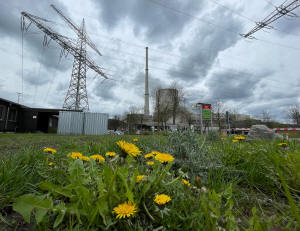Atomic 'angst' over? Germany closes last nuclear plants
 Send a link to a friend
Send a link to a friend
 [April 15, 2023]
By Riham Alkousaa [April 15, 2023]
By Riham Alkousaa
BERLIN (Reuters) -Germany will pull the plug on its last three nuclear
power stations by Saturday, ending a six-decade programme that spawned
one of Europe's strongest protest movements but saw a brief reprieve due
to the Ukraine war.
The smoking towers of Isar II, Emsland and Neckarwestheim II reactors
were to shut forever by midnight on Saturday as Berlin enacts its plan
for fully-renewable electricity generation by 2035.
Following years of prevaricating, Germany pledged to quit nuclear power
definitively after Japan's 2011 Fukushima disaster sent radiation
spewing into the air and terrifying the world.
But the final wind-down was delayed last summer to this year after
Moscow's invasion of Ukraine prompted Germany to halt Russian fossil
fuel imports. Prices soared and there were fears of energy shortages
around the world - but now Germany is confident again about gas supplies
and expansion of renewables.
Germany's commercial nuclear sector began with the commissioning of the
Kahl reactor in 1961: eagerly promoted by politicians but met with
scepticism by companies.

Seven commercial plants joined the grid in the early years, with the
1970s oil crisis helping public acceptance.
Expansion, however, was throttled to avoid harming the coal sector, said
Nicolas Wendler, a spokesperson for Germany's nuclear technology
industry group KernD.
But by the 1990s more than a third of electricity in the newly-reunited
Germany came from 17 reactors.
The next decade, a coalition government including the Greens - who grew
out of the 1970s anti-nuclear movement - introduced a law that would
have led to a phase out of all reactors by about 2021.
Former Chancellor Angela Merkel's conservative-led governments went
back-and-forth on that - until Fukushima.
'ECONOMIC STUPIDITY'
Arnold Vaatz, a former lawmaker for Merkel's Christian Democrats (SPD),
said the decision was also intended to sway a state election in Baden
Wuerttemberg where the issue was playing into the hands of the Greens.
"I called it the biggest economic stupidity by the party since (it was
first in government it) 1949 and I'm sticking to that," Vaatz, one of
only five conservative lawmakers who opposed the exit bill, told
Reuters.
The last three plants contributed only around 5% of electricity
production in Germany in the first three months of the year, according
to the economy ministry.

[to top of second column]
|

A general view shows the nuclear power
plant Isar 2 by the river Isar in Eschenbach near Landshut, Germany,
April 13, 2023. REUTERS/Christine Uyanik

And nuclear power made up just 6% of Germany's energy production
last year, compared to 44% from renewables, data by the federal
statistics office showed.
Still, two thirds of Germans favour extending the lifespan of
reactors or connecting old plants back to the grid, with only 28%
backing the phase-out, a survey by the Forsa institute showed
earlier this week.
"I think this is certainly fed to a large extent by the fear that
the supply situation is simply not secure," Forsa analyst Peter
Matuschek told Reuters.
The government says supply is guaranteed after the nuclear phase-out
and that Germany will still export electricity, citing high gas
storage levels, new liquid gas terminals on the north coast and
renewable energies expansion.
However, nuclear power proponents say Germany will have to go back
to nuclear eventually if it wants to phase out fossil fuels and
reach its goal of becoming greenhouse gas-neutral across all sectors
by 2045 as wind and solar energy will not fully cover demand.
"By phasing out nuclear power, Germany is committing itself to coal
and gas because there is not always enough wind blowing or sun
shining," said Rainer Klute, head of pro-nuclear non-profit
association Nuklearia.

With the end of the atomic power era, Germany has to find a
permanent repository for around 1,900 highly radioactive casks of
nuclear waste by 2031.
"There are still at least another 60 years ahead of us, which we
will need for the dismantling and the long-term safe storage of the
remnants," said Wolfram Koenig, head of the Federal Office for the
Safety of Nuclear Waste Management.
The government also acknowledges that safety issues remain given
that neighbours France and Switzerland still depend heavily on
nuclear power.
"Radioactivity does not stop at borders," said Inge Paulini, head of
Germany's Radiation Protection Office, noting that seven plants in
neighbouring countries were less than 100 km (62.14 miles) from
Germany.
(Reporting by Riham Alkousaa, Additional reporting by Maria
Martinez;Editing by Friederike Heine and Andrew Cawthorne)
[© 2023 Thomson Reuters. All rights
reserved.]This material may not be published,
broadcast, rewritten or redistributed.
Thompson Reuters is solely responsible for this content. |